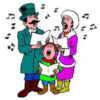Are there any links between carols, hymns and chants? Ah yes, carols, hymns and chants…
Everyone familiar with things like Gregorian chant? Chants were taken up by monks and pilgrims as they were engaged in either ritual processions like funerals or on pilgrimage. Gregorian chant is just a more contemporary version of an ancient practice. Besides assisting meditation while they travelled, it would also serve the purpose of making their presence on the road more visible to passing horsemen.
So they were road tunes. Sort of like singing along to the radio in the car. Yes, helping keep the pace and it would also tell highwaymen that it was monks coming and that there wouldn’t be anything to steal.
Carols were adapted to religious use for their mystery plays where they served as a form of recitation from the Bible, originally in Latin, and later when the Pope of the time forbade clergy from performing on stage they would continue to be used by actors guilds.
Like the Greek chorus? Ah, indeed, they were derived from traditions like the Greek chorus. Even in the original communal version as opposed to the religious, dancers would listen to a singer leading the carol and then sing a response sort of like square dancing these days, but circles. The world carol was derived from a french word which means circle and we still speak of social circles. Originally, the idea was literal.
Alongside all this, trade guilds held their own mystery plays. The original Roman word misterium or ministerium was a reference to craft. Their plays were an initiation into what was expected of them now that they were part of, say, the Stonemason community, or the blacksmiths, or any other such group.
Carols were and still are a powerful force. Originally, carols told the story of living in your town, and living on the land you did, in the country you did. There wasn’t any difference to start. Your nation and the city you lived in were for a very long time the same thing, and the chants, songs and even hymns made it clear to one and all what it meant to live there and what you meant to your community. The Roman hymns were not even taken up by normal citizens, they were sung by priests. Today we still have carols, hymns, even chants, and they still set the mood and thus affect the behaviour of pretty much everyone in a community. We even call the musical slogans we hear, jingles.
Who ultimately controls the music you hear in today’s society?
I think the music is what really makes Christmas for me. The rest of it I don’t care about. Who sets the mood and cues the holidays? Brings people out into the streets?
Shops. TV commercials like Coke.
They call it the music industry these days for a reason. Most of it has been decided not by artists but by the golden rule. Originally, music was not a profession, it was a tradition, and members of any given family might have a skilful musician among them. Commonly in Greek myth, they refer to shepherds and other such professionals as playing music and singing while they were doing there job. Farmers would sing in the fields. It wasn’t a practice unique to African culture.
I think that’s where soul music came from. Slaves singing in the fields.
Your thoughts are welcome. Be well friends.
Travis Saunders
Dragon Intuitive
~science,mysticism,spirituality~



Leave a Reply